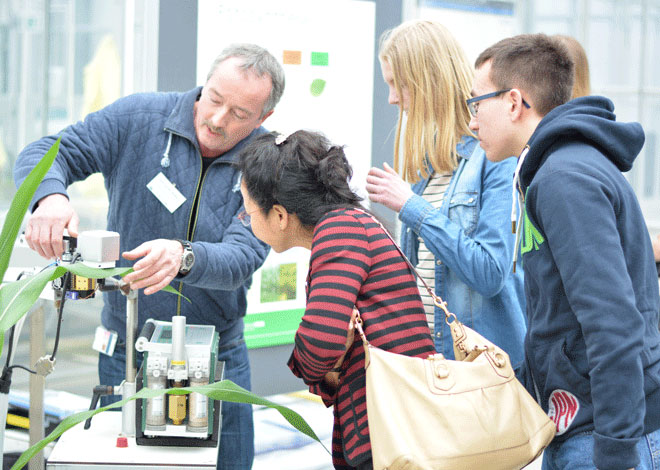Choosing a degree programme: begin on time
When choosing a degree programme: begin on time! A good choice of a programme is the basis for a successful study at a university of applied sciences (HBO) or university. It takes a lot of time to discover all of the possible degree programmes being offered. And perhaps it will take even more time to think carefully about whether or not a degree programme is suitable for you. Young adults often need their parents’ help in this. They sometimes find it difficult to look ahead. But that is very important because there’s a ‘snake in the grass’: you have to be certain that you qualify for admission to the programme of your choice. Choosing a degree programme: begin on time!

Choosing a degree programme: begin on time
Easy and difficult choices
At times young adults have to make choices about things that aren’t really very important. Those are relatively easy choices. Which pair of jeans shall I buy? Where shall I go this evening? Young people talk about choices like these with their friends.
But young people prefer to discuss complicated choices with their parents. They very often have to make choices that can have far-reaching consequences. Which subjects shall I choose at secondary school and what level of exams shall I take? At the standard level or at a higher one? And after secondary school . . . which Bachelor’s programme suits me? Young people want to discuss these choices with their parents. Fortunately. But that costs time and energy. My advice to parents: when choosing a degree programme: begin on time.
Learn to choose
Learning to choose is an art in itself. The more complicated a society, the more difficult it is to make choices. Plus, the more choices that have to be made. On the one hand, it’s wonderful that there is so much to choose from nowadays. But on the other hand, this makes life more complicated. Learning how to successfully shape your life and your career is something you need to know throughout you life. You can’t automatically make good choices. You have to learn how to choose. But leaning to make a good choice isn’t a subject taught at school. Most young people learn the skill of making good choices from their parents. I advise parents to begin stimulating this learning process on time. Ask your son or daughter about the arguments on which choices are made. Start by talking about seemingly unimportant things. The important choices will follow later. Choosing a degree programme: begin on time to help your child plan his or her own study career.
Arguments and feeling
A young adult will soon discover that two things are important when making choices: arguments and feeling. What does your head say and what does your heart say? Begin talking about these things on time. How do you make choices? And evaluate that too … was your choice a good one? Or should you have done things differently? Learning to make good choices, growing in the decisions you make and taking a critical look at yourself… those are lessons for life.
Choosing your degree programme and your career
Talk with your son or daughter about the five essential questions when choosing a degree programme or career.
- Who am I and what can I do?
- What do I want, what motivates me?
- What sort of work suits me?
- What do I want to become?
- Who can help me in this?
Choosing a degree programme: begin on time with Open Days
Educational experts advise young people to spend a lot of time on choosing a degree programme in the two years before their final exams. We advise you to attend a number of Open Days. Is the student physically unable to go to the HBO or university? Perhaps there are Open Days online, a possibility offered, for example, by Wageningen University. Stimulate your son or daughter to look at more than only one HBO or university. Every educational institution is different. Even if the programmes have the same names, the content and the manner of teaching can greatly differ. It’s important that the person choosing a degree programme has time to discover what best suits him or her. A clever secondary school student compares both programmes and educational institutions. That takes a lot of time. So, when choosing a degree programme: begin on time. And be critical. Some programmes do everything to make a good impression. But is that reality?

Go with your child to the Open Day; begin choosing a degree programme on time
It’s wonderful if you as a parent may and can go to an Open Day. From a distance, you can watch what happens, what the atmosphere is like and if it suits your child, how students and teachers react to questions asked by your son or daughter, etc. There are also often special programmes for parents. As a parent, try to ask clever questions.
Would you like to know when Open Days are held at the diverse educational institutions? You can find this information on the site of the HBO or university. Is it only possible to ‘attend’ an online Open Day? Watch this with your son or daughter. And remember to talk about what you saw. What was interesting and what not? And why?
And then… prospective students’ days
After the Open Day, it’s advisable for a student to attend one or more prospective students’ days. This is a day in which your son or daughter can be a student among the other enrolled students. He or she can check whether their choice is really the right one. Sometimes there are group prospective students’ days, sometimes they are individual and sometimes you can ‘try studying online’.
Most students very much enjoy attending a programme for a day with an individual student. Together with a senior student, you can attend a normal day of lessons. Perhaps you’ll be unlucky and attend a less stimulating lecture, but that too is part of studying. But the senior student accompanying you can tell you how often such lectures occur. And if that is often… then perhaps you should make another choice. As a parent, discuss a prospective students’ day carefully.
When to apply?
Students should apply before 1 May for most degree programmes. There are also degree programmes with an enrolment restriction, that is programmes accepting only a limited number of students, such as nutrition & health, biotechnology or molecular sciences. For more information, go to www.wur.nl for WUR programmes and to Study in Holland for other programmes. The final date for applying to these degree programmes is 15 January.
A student can be admitted to all other degree programmes if he or she meets the admission requirements. But even if a student has the correct pre-university training, this does not necessarily mean that the degree programme is suitable. For this reason, the degree programme check or degree programme matching was created a few years ago. This is a final chance for students to really check whether or not they have chosen the right degree programme.

